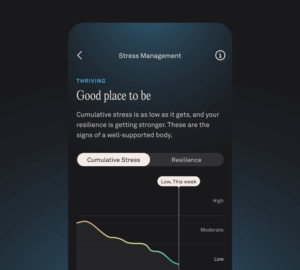The journey of pregnancy is a remarkable forty-week transformation, divided into three trimesters, each bringing its own set of changes and challenges. It’s natural to wonder: What pregnancy symptoms are normal, and what are red flags?
“Your doctor or midwife is your primary source for understanding if what you feel is an expected part of pregnancy,” says Chris Curry, MD, PhD, Oura’s Clinical Director of Women’s Health. “Since they are not always available, having a trusted source of information can help you understand if what you are experiencing is expected, or if it’s a warning sign your body is giving you to contact your care team.”
Oura is here to guide you through your pregnancy step-by-step with Pregnancy Insights, an Oura feature that serves as your pregnancy companion, providing scientifically backed, trimester-specific insights and support.
Let’s explore the symptoms you might experience, trimester by trimester, and what signs could mean it’s time to get in touch with your healthcare provider.
Mental Health Warning Signs in Pregnancy
Before jumping into physical symptoms, it’s important to understand that your mood and mental health may also fluctuate during pregnancy. Beyond changing hormone levels, pregnancy can be an emotional rollercoaster as you navigate new experiences, shifting identity, and the anticipation of parenthood. Mood swings, tearfulness, anxiety, and irritability are all common—and can happen or worsen at any point during pregnancy or postpartum.
However, if these feelings become overwhelming, persistent, or interfere with your ability to function, it may be a sign of something more serious, such as prenatal depression or anxiety. Warning signs to watch for include:
- Persistent sadness, hopelessness, or lack of interest in things you usually enjoy
- Constant worry, panic attacks, or intrusive thoughts
- Trouble sleeping not related to physical discomfort
- Difficulty bonding with your pregnancy or imagining life with your baby
- Thoughts of harming yourself or your baby
If you’re experiencing any of these symptoms, it’s important to reach out for help. You’re not alone, and help is available. Talking to your partner, a friend, or healthcare provider can be the first step in getting the support you deserve.
| If you’re in the U.S. and in need of urgent support, contact the National Maternal Mental Health Hotline. Call or text 1-833-9-TLC-MAMA (1-833-852-6262) to connect with counselors 24 hours a day, 7 days a week. English- and Spanish-speaking counselors are available. Visit this website if you are outside the US. |
First Trimester (Weeks 1-13): Your Journey Begins
The first trimester is a time of rapid change driven by a surge in hormones that signal your body to support pregnancy. Human chorionic gonadotropin (hCG) rises quickly (this is what is tested for in pregnancy tests!) and is often responsible for many of the (more challenging) first-trimester symptoms.
Progesterone also increases, which supports the uterine lining and prevents contractions, but also can lead to fatigue and digestive slowdowns. Estrogen levels rise steadily, stimulating uterine growth and improving blood flow for the growing pregnancy.
Meanwhile, your blood volume expands, metabolism shifts so you can direct nutrients to the growing pregnancy, and your immune system adapts so that it doesn’t identify the fetus as an intruder. And this all happens before you may even know you’re pregnant!
Many of these changes mimic PMS (premenstrual syndrome), making it difficult to distinguish early pregnancy from a typical cycle until a missed period or positive pregnancy test.
Normal First Trimester Symptoms:
- Morning Sickness (Nausea & Vomiting): Despite the name, morning sickness can strike at any time of day or night. It’s common, affecting up to 88% of women, and is often one of the first signs, starting around 6 weeks and subsiding by the second trimester.
- Fatigue: Fatigue is nearly universal during pregnancy as the body’s energy is redirected to support early fetal development.
- Headache: Headaches are common in the first trimester, often triggered by hormonal changes, increased blood volume, fatigue, stress, dehydration, or caffeine withdrawal. Migraine sufferers may notice worsening symptoms early on—though some report improvement later in pregnancy.
- Sleeping Difficulty: Despite rising progesterone levels—known for their sedative effects—disrupted sleep in the first trimester is common due to hormonal shifts, increased nighttime urination, vivid dreams, and growing physical discomfort.
- Sore Breasts: Hormonal surges can make your breasts feel tender, swollen, and heavier, similar to pre-period sensations but often more intense. Breasts may begin to grow or change shape.
- Bloating and Constipation: Elevated progesterone levels in early pregnancy relax smooth muscle tissue, including in the gastrointestinal tract, slowing digestion and often leading to bloating and constipation.
- Frequent Urination: As your blood volume increases, your kidneys produce more urine, so you’ll likely find yourself making more trips to the bathroom.
- Mood Changes: Fluctuating hormone levels combined with physical changes can lead to emotional highs and lows.
- Mild Cramping: As blood flow to the uterus increases early in pregnancy, and the size of the uterus increases, it is common to have some feelings of heaviness or cramping.
- Food Cravings & Aversions: Anywhere between 50 and 90% of women experience food aversions and cravings, which can start as early as five weeks. Common food aversions include meat, eggs, milk, tea, coffee, and strong-smelling or spicy foods. The most common cravings in the first trimester include sweets, salty foods, savory foods, and starchy foods.
| Member Data: Analyzing de-identified Oura member data, we found that body temperature, respiratory rate, and heart rate increase after conception, while HRV drops after conception. Read more. |
First Trimester Red Flags: When to Call Your Doctor
While many first-trimester symptoms are normal, some can signal a potential complication. Do not hesitate to contact your healthcare provider right away if you experience:
- Severe Abdominal Pain: Sharp, persistent, or severe abdominal pain in pregnancy that doesn’t go away could indicate a serious issue like an ectopic pregnancy or miscarriage.
- Severe Vomiting: If you are experiencing severe or persistent vomiting and are not able to keep down food or fluids, you may have hyperemesis gravidarum. This can lead to dehydration and other complications.
- Fever During Pregnancy: A fever over 100.4°F (38°C) should be reported.
- Any Vaginal Bleeding: Any vaginal bleeding in pregnancy, especially if accompanied by pain or clots, warrants immediate medical attention as it could be a sign of an ectopic pregnancy. Early in pregnancy, it is not clear if the pregnancy is in the correct location (uterus) or outside of the uterus (ectopic), and your care team should be involved to help keep you safe. While ectopic pregnancies happen in only about 1% of all pregnancies, they can be a big deal. Miscarriage is also very common, with up to one in five pregnancies ending in miscarriage, most commonly in the first 12 weeks.
Second Trimester (Weeks 14-27): Welcome to the “Golden” Period
The second trimester is often considered the most comfortable stretch of pregnancy (hence why it’s referred to as the “golden” trimester). Hormone levels, such as hCG, begin to plateau, while estrogen and progesterone continue to rise steadily, supporting uterine growth, increasing blood flow, and preventing uterine contractions. Many early symptoms, like nausea and fatigue, begin to ease, and you may enjoy an increase in energy.
Physical changes—like a growing belly and weight gain—become more noticeable, and at around 18–20 weeks, many expectant parents can learn the baby’s sex via ultrasound. This trimester also brings one of the most exciting milestones: fetal movement, often first felt in the late second trimester and described as gentle flutters or “quickening.”
 Normal Second Trimester Symptoms:
Normal Second Trimester Symptoms:
- Lower Back Pain: As your uterus expands and your center of gravity shifts, it’s common to experience lower back discomfort. The hormone relaxin also loosens ligaments and joints, which can contribute to instability and strain on your back muscles.
- Skin Changes: Increased blood flow and hormonal fluctuations can cause the “pregnancy glow,” but may also bring hyperpigmentation (like melasma or the linea nigra), stretch marks, or acne flare-ups. These are typically harmless and fade postpartum.
- Braxton Hicks Contractions: These “practice” contractions are usually painless tightenings of the uterus that can start in the second trimester.
- Leg Cramps: Leg cramps in pregnancy can become more frequent, especially at night. It’s not clear why leg cramps happen in pregnancy, but it’s believed to be a combination of metabolic changes, electrolyte imbalances, vitamin deficiencies, or weight gain.
- Nasal Congestion or Nosebleeds: Increased blood volume can lead to swollen nasal passages in 20% of women, which can be confused for allergies or getting sick
Second Trimester Red Flags: When to Call Your Doctor
While the second trimester is often smoother, it’s still vital to be aware of potential warning signs:
- Decreased Fetal Movement: If you are past 20-24 weeks and notice a significant decline in fetal movement, contact your doctor right away. Some doctors suggest at least 10 movements over an hour, but you may get different advice depending on your situation.
- Sudden Swelling in Face, Hands, or Feet: While some swelling is normal, sudden swelling (especially if rapid, happening in the arms and face, and accompanied by other symptoms) can be a sign of preeclampsia, which is dangerously high blood pressure during pregnancy. Swelling of just one leg but not the other may also mean a blood clot (deep vein thrombosis, DVT).
- Blurred Vision or Seeing Spots: Some vision changes or worsening eyesight can be normal in pregnancy due to hormonal changes. However, new or worsening vision disturbances can be a sign of preeclampsia or suddenly high blood sugar levels that may happen with untreated diabetes.
- Persistent Contractions (Preterm contractions): If you have regular, painful contractions before 37 weeks that become stronger or closer together, this could be a sign of preterm labor.
- Vaginal Bleeding or Fluid Leakage: Any new bleeding or fluid from your vagina should be reported immediately.
Third Trimester (Weeks 28-40+): The Home Stretch
The final trimester brings increasing physical demands as your baby grows rapidly and your body prepares for labor.
By now, your uterus has expanded from 70 grams to over 1100 grams, your blood volume has peaked, and your organs are shifting to accommodate your growing baby. Braxton Hicks contractions may begin or continue, signaling that your uterine muscles are practicing for delivery.
Many women experience disrupted sleep, shortness of breath, swelling, and overall physical discomfort, but also excitement as key milestones approach, like finalizing birth plans, packing a hospital bag, and counting down the days to meet your baby.
 Normal Third Trimester Symptoms:
Normal Third Trimester Symptoms:
- Increased Fatigue: Pregnancy fatigue tends to be the highest in the third trimester as your body carries more weight and prepares for birth.
- More Frequent Urination: Pressure from the baby on your bladder intensifies, and your kidneys continue to produce more urine than before pregnancy.
- Difficulty Sleeping: Almost 80% of women experience insomnia in the third trimester. Hormonal changes, vivid dreams, night sweats, restless leg syndrome, frequent urination, and physical discomfort all contribute to lower quality sleep.
LEARN MORE: How to Sleep Better During Pregnancy
- Shortness of Breath: Your growing uterus pushes up on your diaphragm, and other changes in hormones alter the way it feels to breathe, and many pregnant women feel short of breath.
- Increased Braxton Hicks Contractions: These “practice” contractions may become stronger and more frequent, though typically remain irregular and painless.
- Pelvic Pressure: As the baby drops lower into your pelvis, you may feel increased pressure and discomfort, possibly worsening back pain.
- Heartburn: Changing hormone levels and the increased pressure of your baby on your stomach can lead to heartburn in pregnancy. It’s one of the most common third-trimester symptoms, affecting 80% of women.
- Swelling of the Hands, Feet, or Ankles: Swelling—called edema—is pronounced in the third trimester, caused by fluid retention and impaired circulation. It can worsen if you spend a lot of time standing up or in hot weather.
Third Trimester Red Flags: When to Call Your Doctor Immediately
As you near your due date, it’s crucial to be vigilant for these signs:
- Decreased Fetal Movement: Once you enter your third trimester, your doctor may recommend that you start counting your baby’s movements (kick counts). If you’re not feeling your baby move in the way you and your doctor expect, try eating or drinking something with a little sugar, or changing your position to encourage activity. Call your doctor if you have tried this and still aren’t feeling movement or suddenly feel a decrease in the baby’s activity.
- Symptoms of Preeclampsia: Preeclampsia is a serious condition where someone’s blood pressure rises to dangerous levels very quickly. Symptoms that may be related to preeclampsia include severe headache, blurred vision or seeing spots, sudden swelling of the face, hands, or feet, severe pain in your upper abdomen (under your ribs), or sudden weight gain.
- Ruptured Membranes (Water Breaking): A gush or continuous trickle of fluid from your vagina needs immediate medical assessment, even if you’re not having contractions.
- Persistent Contractions (Preterm Labor/Labor): If you have regular, painful contractions that are becoming stronger and closer together, especially before 37 weeks, contact your doctor. If you are full-term, this could be the start of labor. If you are preterm, it is more worrisome and may represent preterm labor.
- Vaginal Bleeding: Any new or increased vaginal bleeding should be reported immediately.
- Itching All Over During Pregnancy: Intense, widespread itching, particularly on the palms of your hands and soles of your feet, especially at night, can be a sign of a liver condition called cholestasis.
| Member Data: Analyzing de-identified Oura member data, we found that body temperature remains steady with a spike right before birth, while heart rate continues to climb and HRV continues to decline. However, these metrics typically go back to baseline soon after birth. Read more. |
RELATED: New Research Uses Oura to Predict If Labor Will Start Before or After Due Date










